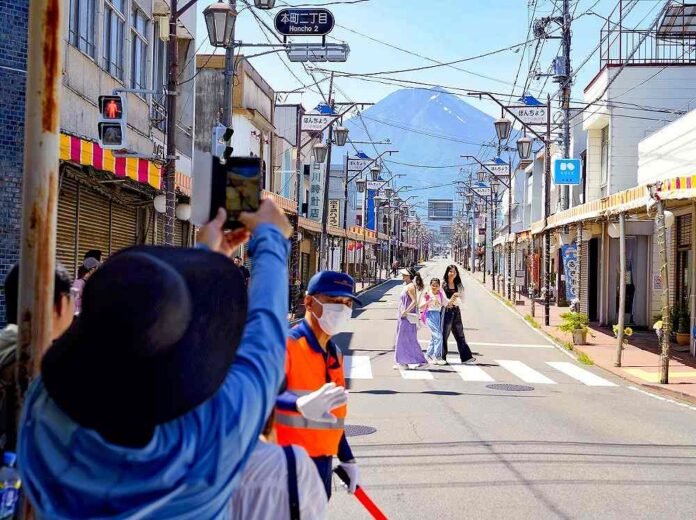Foreign tourists take photos in Fujiyoshida, Yamanashi Prefecture, on July 7.
01:00 JST, July 23, 2024
Local governments are considering charging tourists an accommodation tax to combat overtourism as the number of foreign visitors to Japan increases. Twelve municipalities have already introduced such taxes, while more than 40 are considering introducing them to raise money for improved tourism infrastructure.
But as municipalities draft the new taxes, some accommodation providers are expressing opposition.
Litter, parking violations
The area around a zebra crossing in Fujiyoshida, Yamanashi Prefecture, is teeming with foreign tourists with cameras and smartphones.
The once-deserted shopping area around the intersection has become a hot topic on social media, as visitors can take photos of a classic Japanese shopping street with Mt. Fuji in the background. On some days, more than 4,000 tourists visit the area.
Some tourists take photos while standing in the middle of the road or crossing the street when the traffic light is red.
“It’s nice to see the area bustling with people, but many people don’t follow traffic rules,” said a 68-year-old owner of a home goods store in the district. “I hope something can be done about it.”
In March, Fujiyoshida announced that it wanted to introduce a tourist tax.
The city’s scenic Arakurayama Sengen Park, which offers panoramic views of Mount Fuji and a five-story pagoda, is expected to attract a total of nearly 1.7 million visitors this fiscal year, compared with about 300,000 in fiscal 2016. The surge in tourists has led to littering and unauthorized parking.
The tourist tax that the city wants to introduce in the 2026 budget year should serve to finance the fight against overtourism.
Half of the costs covered
A lodging tax is a local tax levied on hotel guests. It is classified as a special tax and local governments must adopt a draft regulation specifying the purpose of the tax, when the tax is applied and the tax rate, and obtain approval from the Minister of Internal Affairs and Communications to implement one.
The first such tax was introduced by the Tokyo Metropolitan Government in 2002, and 12 municipalities have introduced similar taxes, including three that will soon begin levying them, while more than 40 municipalities are considering introducing one.
Momentum for such taxes waned as the pandemic took hold and the tourism industry shrank. But Japan’s National Tourism Organization said on Friday that the number of visitors to Japan reached a record 17.77 million in the first half of 2024, and the rapid recovery in visitor numbers has led to renewed momentum for accommodation taxes.
The taxes have proven to be a major source of revenue for municipalities that have introduced them. Kyoto, which forecasts ¥4.8 billion from its lodging tax in its budget for fiscal 2024, began operating its Sightseeing Limited Express Bus in June, which stops only at major tourist sites. The measure is intended to create more space for residents on city buses, which have been overcrowded.
Fukuoka introduced its own tourist tax in April 2020. A city official said the revenue has helped the city “implement new projects and boost tourism in the city.”
With tax revenues of about ¥2.8 billion, or nearly half of the ¥5.8 billion in tourism-related expenditures in the 2024 budget, the city aims to attract international conventions and other events.
Opposition from companies
However, accommodation companies, which are responsible for collecting the tax, have expressed concerns.
Last month, the snowy resort town of Yuzawa in Niigata Prefecture announced it would introduce a lodging tax to help fund a transportation network connecting major stations and lodging areas. Hotel operators convened by the city voiced concerns about the administrative burden and reduced competitiveness resulting from the actual rise in lodging prices.
Eighteen groups of lodging establishments in Miyagi Prefecture met on July 8 to express their opposition to the tax in writing to the Miyagi Prefectural Government, which is considering submitting a draft regulation that would impose a flat rate of ¥300 for lodging establishments throughout the prefecture.
The groups are concerned about the tax burden that visitors may face, as some municipalities have already imposed a beach tax and because the sector has not yet recovered from the pandemic.
Kinichi Fujita, vice chairman of the council of the ryokan association in the hot spring village of Naruko Onsen-kyo in Osaki, Miyagi Prefecture, fears the tax will drive hotel guests to neighboring prefectures.
“The business community has not given support and is not convinced of its implementation. [of a lodging tax],” he said.



